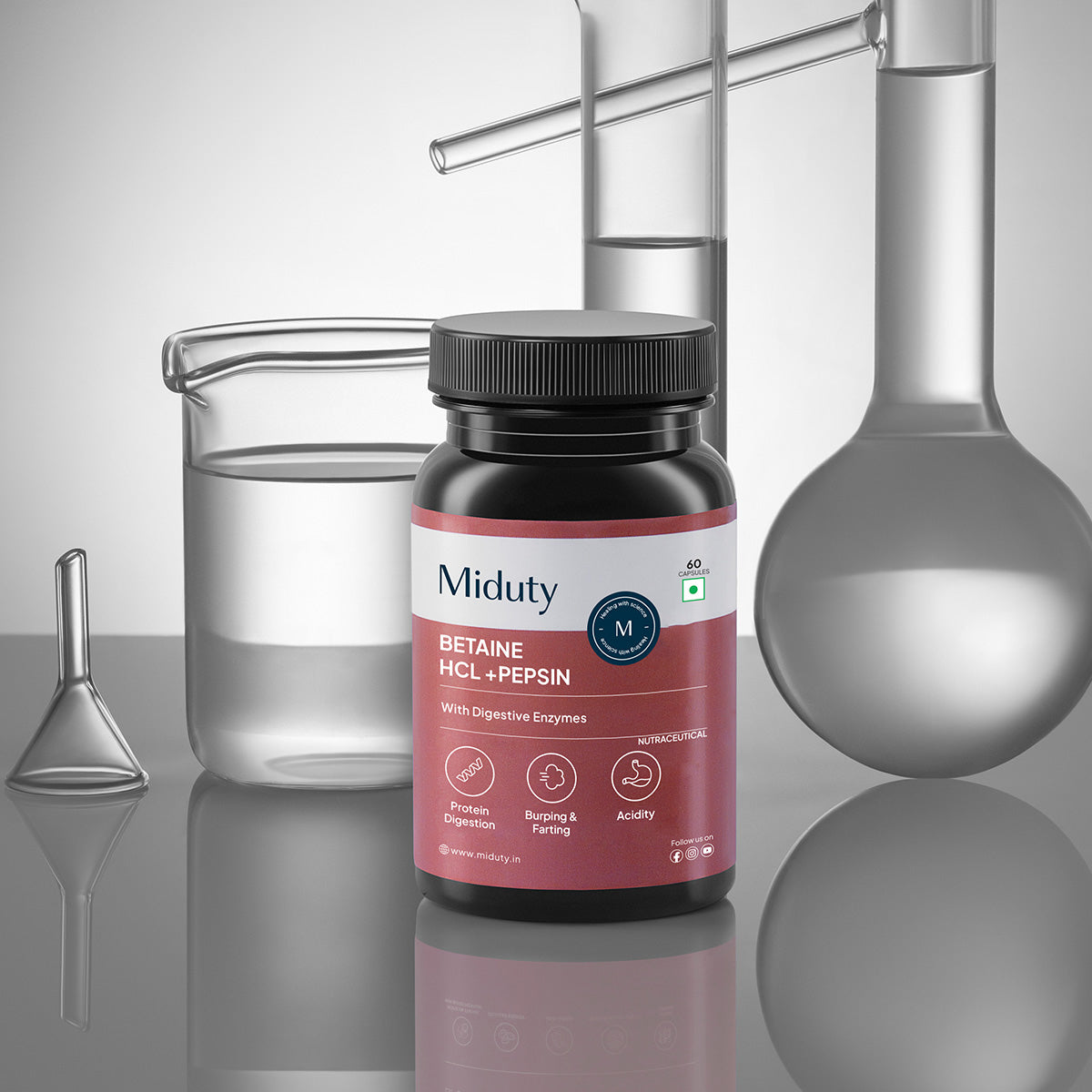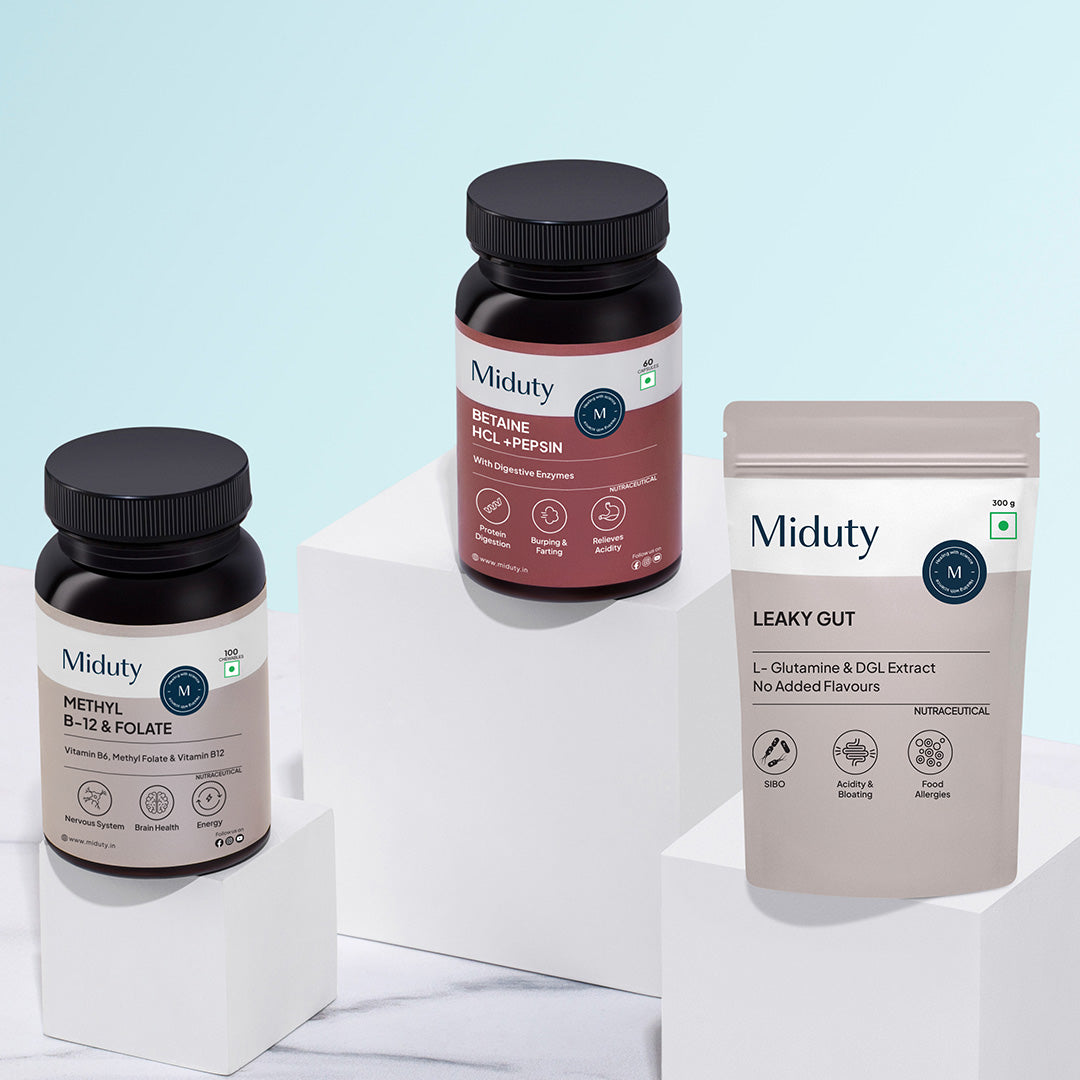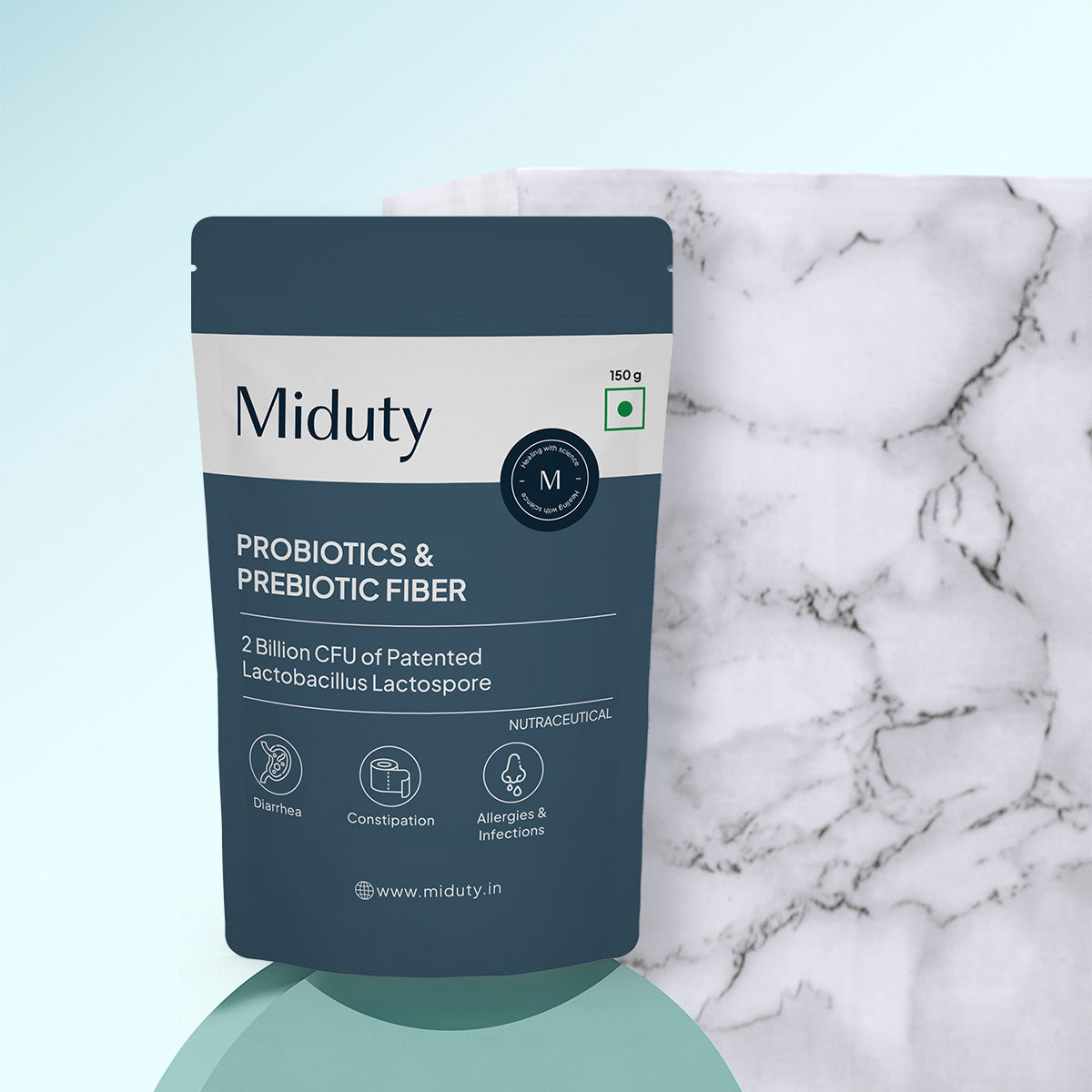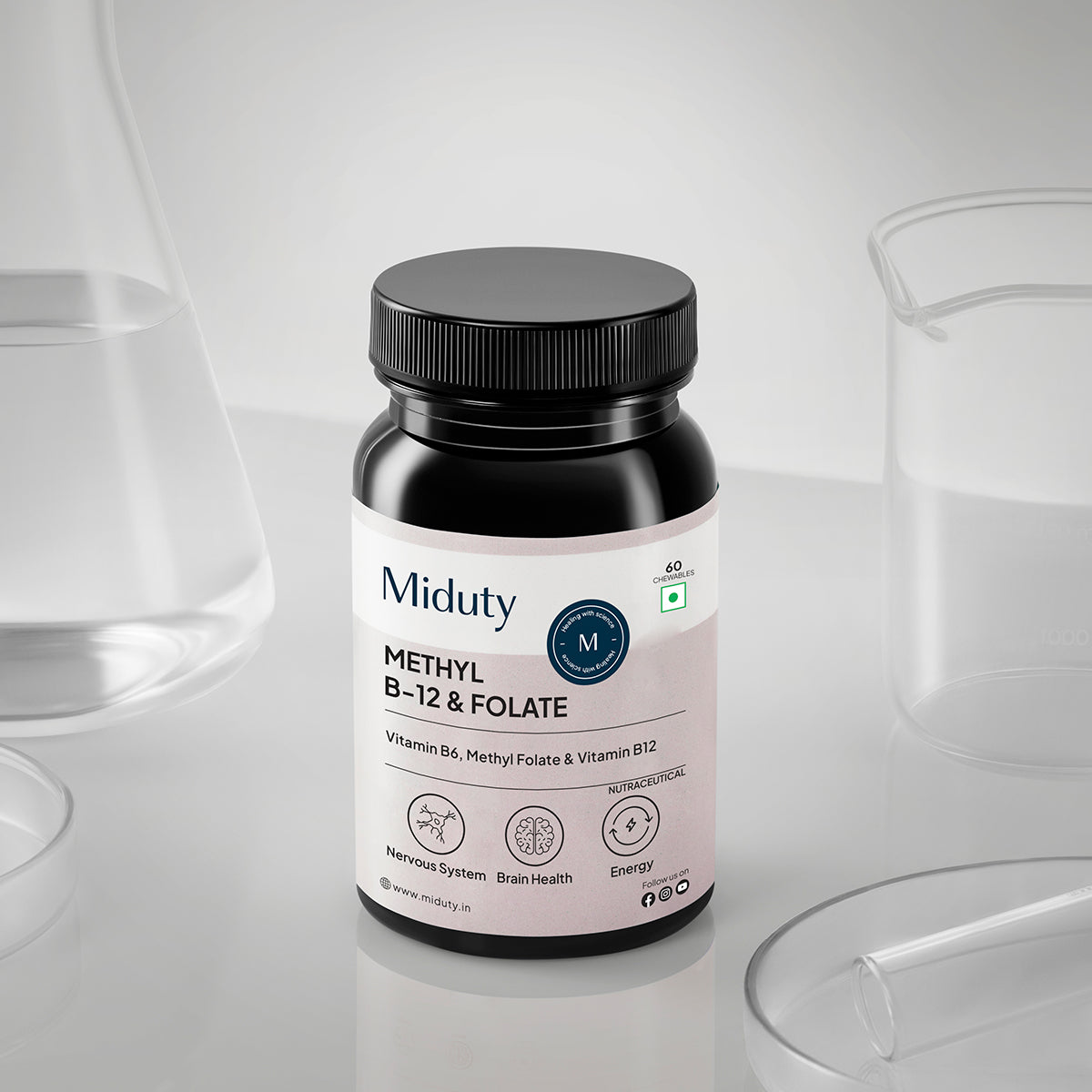
Understanding the Symptoms of Bad Gut Health and How Betaine HCL Can Help
Key Takeaways
1. Listen to Your Gut: Bloating, heartburn, fatigue, and mood swings can be your gut’s way of asking for help. Spotting these signs early is key to better digestive health.
2. It's Not Always Too Much Acid: Low stomach acid is often behind reflux and nutrient issues. Tackling this root cause brings longer-lasting relief than antacids.
3. Betaine HCL Boosts Digestion: This supplement supports stomach acid, improves protein breakdown, and enhances nutrient absorption especially useful as we age.
4. Start Small with Betaine HCL: Begin with a low dose, observe your body, and adjust gradually. Pair with enzymes for even stronger results.
5. Fixing Your Gut Takes More: Supplements help, but clean eating, stress control, and consistency are essential for long-term gut health.
It's likely that if you're reading this, you've encountered the confusing and frequently surprising state of digestive problems. You're not alone if you have unwanted spells of bloating before significant events, cramps that can occur at the most inopportune moments, or the never-ending struggle to understand what your gut is trying to tell you. I know the daily struggles that come with having poor gut health since I've been there too.
Our gut is often considered the second brain of our body because of its immense influence on our overall health and well-being. When it functions optimally, we feel great, but when it's struggling, it can send us a multitude of warning signals.
If you've been experiencing digestive discomfort, heartburn, or poor gut health, your gut might be trying to tell you something important. One potential solution to address these issues is Betaine HCL, a supplement that can aid in digestion and alleviate various symptoms of bad gut health.
In this blog, we'll explore some common warning symptoms of poor gut health you might be experiencing and how Betaine HCL (betaine hydrochloride) can be a helpful remedy.
Part 1: Symptoms of Poor Gut Health
Your gut frequently expresses its discomfort invisibly yet clearly. This section will help you understand symptoms of poor gut health and determine whether it's appropriate to take preventative measures for your digestive health.
- Frequent Indigestion: Frequent indigestion or dyspepsia, characterised by discomfort or pain in the upper abdomen, is a common sign of poor gut health. It may manifest as a feeling of fullness, bloating, or burning in the chest (heartburn). This discomfort often occurs after eating, and it can significantly impact your quality of life.
- Chronic Acid Reflux: Acid reflux, also known as gastroesophageal reflux disease (GERD), occurs when stomach acid flows back into the esophagus, causing a burning sensation in the chest. If you regularly experience acid reflux, it could be one of the major symptoms of bad gut health, meaningthat your stomach is not producing enough acid to digest food properly.
- Gas and bloating: Excessive gas and bloating are telltale signs of an imbalanced and poor gut health. When your digestive system struggles to break down food, it can lead to the buildup of gas in your stomach and intestines, resulting in discomfort and a distended abdomen.
- Food Sensitivities: Food sensitivities or intolerances can wreak havoc on your digestive system. Symptoms like diarrhea, constipation, nausea, or stomach cramps after eating specific foods may indicate that your gut is having trouble processing certain substances due to bad gut health.
- Nutrient Deficiencies: If your gut is not absorbing nutrients efficiently, you may experience nutrient deficiencies, one of the common symptoms of poor gut health. Common deficiencies arising out include iron, vitamin B12, and magnesium, which can lead to fatigue, weakness, and various other health issues.

- Bad Breath: Persistent bad breath, also known as halitosis, can be an embarrassing symptom of bad gut health. The presence of excessive bacteria or undigested food in your digestive tract can contribute to foul-smelling breath.
- Skin Problems: The condition of your skin is often a reflection of your internal health. Conditions like acne, eczema, or psoriasis can sometimes be linked to bad gut health. Inflammation and an imbalanced gut microbiome can trigger or exacerbate these skin conditions.
- Chronic Fatigue: If you're constantly feeling tired despite getting enough sleep, your poor gut health is to blame. An unhealthy gut can impair nutrient absorption and lead to a lack of energy.
- Mood Swings and Mental Health Issues: The gut-brain connection is well documented. An imbalanced gut can contribute to mood swings, anxiety, and even depression. It's often referred to as the "gut-brain axis," where poor gut health can impact your mental well-being.
- Unexplained Weight Loss: Significant and unexplained weight loss or gain can be attributed to digestive problems. Whether it's due to malabsorption of nutrients or changes in appetite caused by gut issues, it's essential to investigate these changes further.
While beneficial in relieving heartburn and acid reflux symptoms momentarily, antacids are not a long-term cure for underlying gut problems. Their main function is to neutralize stomach acid, which can impede digestion and nutritional absorption.
Since antacids don't treat the underlying causes of gut issues, such as low stomach acid or digestive abnormalities, overusing them may result in rebound acid production.
Part 2: Understanding Betaine HCL
Now that we have discussed the symptoms of poor gut health you might be facing, let's delve into Betaine HCL, a supplement that could help alleviate the above mentioned symptoms of bad gut health.
What is Betaine HCL?
Betaine hydrochloride, often referred to as Betaine HCL, is a compound derived from beets. It is a natural substance that can be beneficial for improving digestion and help improve from poor gut health.
Betaine HCL is primarily known for its ability to increase stomach acid levels, which can be particularly helpful for individuals with low stomach acid production, a condition known as hypochlorhydria.
By keeping an eye out for symptoms of poor gut health like bloating, indigestion, and heartburn after meals, you can figure out if you have low stomach acid. Low stomach acid may be the cause of persistent gas, poor digestion, or nutrient deficiencies (such as a lack of iron or vitamin B12).
How Does Betaine HCL Work?
When you consume food, your stomach produces hydrochloric acid (HCL) to help break down the food and kill harmful bacteria. Adequate stomach acid is crucial for the digestion and absorption of nutrients. However, as we age or due to various health conditions, our stomach's ability to produce sufficient HCL can decrease, leading to digestive problems.
According to research published in the National Library of Medicine, Betaine HCL(betaine hydrochloride) works by providing supplemental HCL to the stomach, helping to create the acidic environment necessary for proper digestion. It can enhance the breakdown of proteins and the absorption of vital nutrients like vitamins and minerals.
Part 3: Using Betaine HCL for Bad Gut Health
Identifying the Need for Betaine HCL
Before you start using Betaine HCL as a digestive aid to fix your bad gut health, it's crucial to determine whether it's the right solution for your specific situation. Here are some signs that might indicate a need for Betaine Hydrochloride:
- Low Stomach Acid: If you've been diagnosed with or suspect you have low stomach acid (hypochlorhydria), Betaine HCL can be beneficial. Common symptoms of low stomach acid include bloating, belching, and heartburn leading to poor gut health.
- Incomplete Digestion: If you regularly experience symptoms of incomplete digestion, such as undigested food particles in your stool or a feeling of fullness long after eating, Betaine Hydrochloride may help improve digestion.
- Aging: As we age, our stomach's ability to produce sufficient stomach acid tends to decline. If you are over 50 and experiencing above mentioned symptoms of bad gut health, Betaine Hydrochloride could be a valuable addition to your regimen.
- Nutrient Deficiencies: If you have documented nutrient deficiencies, especially in iron, vitamin B12, or magnesium, Betaine HCL might aid in better nutrient absorption. Additionally, you can take Magnesium or Vitamin B12 & Folate supplements to tackle the deficiencies.
- Stress: By causing the release of stress hormones like cortisol, stress can lower stomach acid production. These hormones have the potential to interfere with proper digestion and decrease stomach acid production, which can result in discomfort and digestive problems.

How to Use Betaine HCL?
If you suspect that Betaine HCL could benefit you, it's essential to start slowly and monitor your body's response. Here's a general guideline for using Betaine Hydrochloride:
1) Consult a Healthcare Professional: Before starting any supplement regimen, consult with a healthcare provider, preferably one with experience in digestive health.
2) Begin with a Low Dose: Start with a low dose of Betaine HCL, typically around 250 mg, taken with a meal that contains protein.
3) Observe Your Body: Pay close attention to how your body responds. You should feel relief from symptoms like bloating, indigestion, and heartburn. If you experience any adverse effects like burning sensations or discomfort, discontinue use immediately.
4) Gradually Increase the Dose: If you don't experience any discomfort, you can gradually increase the dose in subsequent meals. Continue this process until you find the optimal dosage that relieves your symptoms of poor gut health without causing any adverse effects.
5) Monitor Progress: Keep track of your symptoms of bad gut health and overall well-being. Adjust the dosage as needed to maintain digestive comfort.
6) Combine with Digestive Enzymes: In some cases, combining Betaine HCL with digestive enzyme supplements can provide even more comprehensive digestive support.
How to Choose the Best Betaine HCL Supplement?
The best way to choose a Betaine HCL (Betaine Hydrochloride) supplement is to prioritize quality, purity, and individualized dosing. Opt for a reputable brand that undergoes third-party testing for purity and potency. Start with a lower dosage and gradually increase it under the guidance of a healthcare professional to match your specific needs.
Ensure the betaine hydrochloride supplement has minimal additives and fillers, and consider capsule forms for easier digestion.
Miduty's Betaine HCL+Pepsin is here to provide your stomach with the essential acid it needs to bid farewell to acidity once and for all.
What sets us apart?
Our secret lies in the powerful combination of Pepsin and Gentian root. This dynamic duo doesn't just stop at acidity relief; it's a powerhouse remedy for liver and stomach inflammatory conditions.
But that's not all—we've got your gastrointestinal health covered too. Miduty's Betaine HCL + Pepsin provides a perfect solution for tackling pancreatic insufficiency and preventing those pesky gastrointestinal disorders from taking hold.
Conclusion
Your gut plays a vital role in your overall health, and when it's not functioning optimally, it can send you warning signals through various symptoms. If you've been experiencing digestive discomfort, indigestion, heartburn, or other symptoms of poor gut health, it's essential to pay attention to these signs.
Betaine HCL can be a valuable tool for improving digestive health, particularly if you have low stomach acid or other poor gut health issues. However, it's crucial to approach its use cautiously, under the guidance of a healthcare professional, and to monitor your body's response closely.
Remember that digestive problems can have multiple causes, and betaine hydrochloride might not be the right solution for everyone. To achieve long-term gut health, it's essential to address the root causes of your digestive issues, which may involve dietary modifications, stress management, and other lifestyle changes.
Always prioritize your well-being and seek professional guidance when needed to make informed decisions about your digestive health and reverse the symptoms of bad gut health.
Miduty Betaine HCL + Pepsin gives your stomach the acid it needs to finally say good-bye to acidity. It features a strong blend of Pepsin and Gentian root. This effective combination goes beyond addressing acidity; it serves as an effective solution for liver and stomach inflammatory issues.












